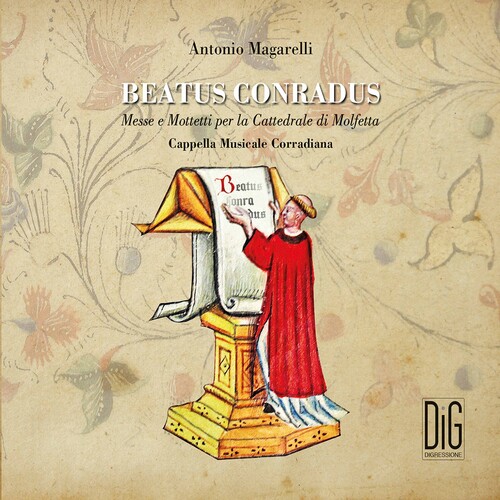Show results for
Deals
- 4K Ultra HD Sale
- 50s Films Sale
- Action Sale
- Alternative Rock Sale
- Anime sale
- Award Winners Sale
- Bear Family Sale
- Blu ray Sale
- Blues on Sale
- British Sale
- Christmas in July
- Classical Music Sale
- Comedy Music Sale
- Comedy Sale
- Country Sale
- Criterion Sale
- Electronic Music sale
- Folk Music Sale
- Horror Sci fi Sale
- Kids and Family Sale
- Metal Sale
- Music Video Sale
- Musicals on Sale
- Mystery Sale
- Naxos Label Sale
- Page to Screen Sale
- Paramount Sale
- Rap and Hip Hop Sale
- Reggae Sale
- Rock
- Rock and Pop Sale
- Rock Legends
- Soul Music Sale
- TV Sale
- Vinyl on Sale
- War Films and Westerns on Sale

Beatus Conradus
- Format: CD
- Release Date: 4/3/2020

Beatus Conradus
- Format: CD
- Release Date: 4/3/2020
- Label: Digressione Music
- UPC: 8054726140993
- Item #: 2280028X
- Genre: Classical
- Release Date: 4/3/2020

Product Notes
In the works of Antonio Magarelli (composed from 2009 to today, but to understand the stylistic canons of Magarelli it is useful to remember also a brief motet from 2007, Pater si non potest, an icon of his style) it seems to be latent, a timid but pervasive curvature towards dissonance, which nevertheless assumes the appearance of a philosophical construct, since such is the prudent use of it that shines through the pieces. As for Schönberg, there is the awareness of the emancipation of dissonance: «eternal fall [...] and backwards, from the side, forward, from all sides [...] is the rejection, even in music, of hierarchies, of centers of reference, of the schemes that become absolute. This means that no sound is fundamental, but every sound can be fundamental» (A. CAPUTO, L'arte nonostante tutto, Roma 2012, p. 65). Magarelli, even when taking up obsolete and outdated compositional canons from the late-nineteenth-century aesthetic (for example in Domine, tu mihi lavas pedes?) unexpectedly becomes postmodern due to the wise taste of quotation and erudite contamination, for the sound layers and I would say historical layers that come from his active assimilation of music history, understood as a history not only of monumenta, but also of documenta.

